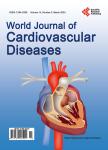Implications of Elevated Serum Cortisol in the Onset of Postoperative Delirium Following Off-Pump Coronary Artery Bypass Grafting: Insights from a Bangladesh-Based Single Center Experience
Implications of Elevated Serum Cortisol in the Onset of Postoperative Delirium Following Off-Pump Coronary Artery Bypass Grafting: Insights from a Bangladesh-Based Single Center Experience作者机构:Department of Cardiothoracic and Vascular Surgery BP Koirala Institute of Health Sciences Dharan Nepal Department of Cardiothoracic and Vascular Surgery Evercare Hospital Dhaka Dhaka Bangladesh Department of Preventive and Social Medicine National Institute of Preventive and Social Medicine Dhaka Bangladesh Department of Thoracic Surgery BP Koirala Memorial Cancer Hospital Bharatpur Nepal Department of Cardiac Surgery United Hospital Limited Dhaka Bangladesh Department of Cardiothoracic Anesthesia Evercare Hospital Dhaka Dhaka Bangladesh Department of Microbiology Kathmandu Medical College Kathmandu Nepal Department of Nephrology Bangabandhu Sheikh Mujib Medical University Dhaka Bangladesh Department of Cardiac Surgery Bangabandhu Sheikh Mujib Medical University Dhaka Bangladesh
出 版 物:《World Journal of Cardiovascular Diseases》 (心血管病(英文))
年 卷 期:2024年第14卷第4期
页 面:252-267页
学科分类:1002[医学-临床医学] 100214[医学-肿瘤学] 10[医学]
主 题:Coronary Artery Bypass Grafting (CABG) Serum Cortisol Postoperative Delirium Bangladesh
摘 要:Background: Following coronary artery bypass grafting (CABG), delirium emerges as a prevalent complication. This study aimed to assess the correlation between elevated serum cortisol levels and the occurrence of postoperative delirium subsequent to off-pump CABG. Methods: Conducted in the Department of Cardiac Surgery at BSMMU from October 2020 to September 2022, this comparative cross-sectional study included a total of 44 participants. Subjects, meeting specific criteria, were purposefully assigned to two groups based on off-pump CABG. Group A (n = 22) consisted of patients with normal serum cortisol levels, while Group B (n = 22) comprised individuals with high serum cortisol levels on the first postoperative day. Delirium onset was assessed at the bedside in the ICU on the 1st, 2nd, 3rd, 4th, and 5th postoperative days using standard tools, namely the Richmond Agitation Sedation score (RASS) and The Confusion Assessment Method (CAM-ICU). Data were collected based on the presence or absence of delirium. Statistical analysis utilized SPSS version 26.0, employing an independent Student’s t-test for continuous data and chi-square and Fischer’s exact test for categorical data. A p-value ≤ 0.05 was considered statistically significant. Results: Group-A had a mean age of 54.50 ± 17.97, and Group-B had a mean age of 55.22 ± 15.45, both with a male predominance (81.81% and 86.36% respectively). The mean serum cortisol level was significantly higher in Group B (829.71 ± vs. 389.98 ± 68.77). Postoperative delirium occurred in 27.3% of Group B patients, statistically significant compared to the 4.5% in Group A. However, patients in Group B who developed delirium experienced significantly longer postoperative ICU and hospital stays (79.29 ± 12.27 vs. 11.44 ± 2.85, p ≤ 0.05). There was one mortality in Group B, which was statistically not significant. Conclusion: This study observed a significant association between elevated serum cortisol levels in the postoperative period a



